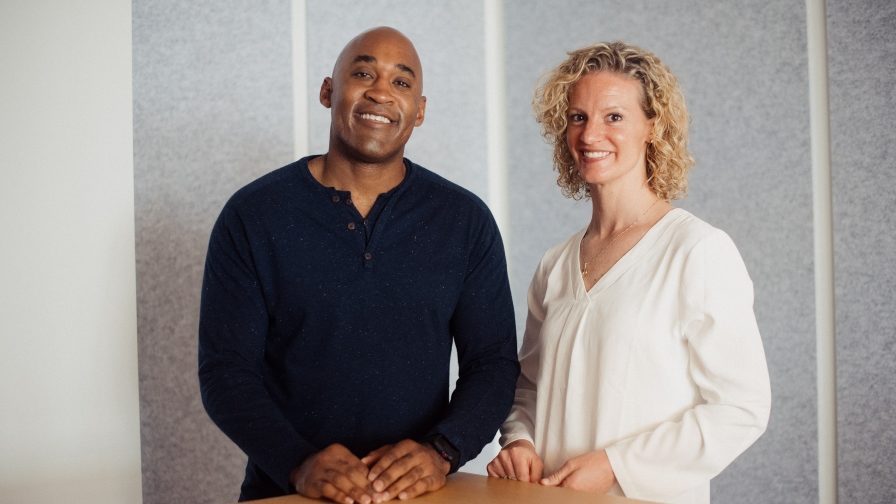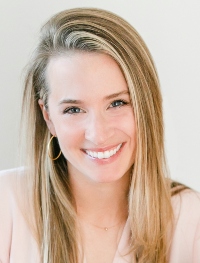
How Two UVA Darden Grads Sharing a Name and Background Secured Significant Venture Funding for Veteran Entrepreneurs
By Dave Hendrick
The power of the University of Virginia Darden School of Business network recently helped propel a multimillion-dollar investment to aid veteran-led startups when two Emilys from two different Darden classes worked together to notch an agreement that should play a role in expanding and diversifying the venture capital ecosystem.

Emily Schuller (MBA ’14)
The connection began when Emily Schuller (MBA ’14) was working through the MBA career development program at USAA, the financial services company serving the U.S. military community she joined after graduating from Darden. As part of her leadership rotation, the Poquoson, Virginia, native and Double Hoo helped spearhead USAA’s sponsorship of Patriot Boot Camp, an initiative supporting entrepreneurship among veterans and their families. The experience offered exposure to both the world of veteran entrepreneurship and the corporate development function at USAA, a sector Schuller later joined after her rotational program.
It also put a fellow Darden alumna, Emily McMahan (EMBA ’10), on her radar.
“Emily McMahan was on the board of directors for Patriot Boot Camp, and because of that relationship, I’d heard her name come up before,” said Schuller, who received an appointment to the U.S. Naval Academy but ultimately earned her undergraduate degree at UVA. “I always thought she’d be a great person to get to know, especially with the Darden connection.”
Schuller, who serves as a lead associate on the corporate development team at USAA, said the connection came to the forefront when, in the course of professional research, she read about the Academy Investor Network (AIN), the early stage investment fund McMahan and fellow managing partner Sherman Williams were raising to support veteran entrepreneurs.
Schuller said she reached out to learn more about the fund, and “one thing led to another.”
The conversations between McMahan and Schuller and their respective organizations eventually culminated in an anchor investment in AIN’s first venture fund, a $50 million seed-stage focused investing vehicle.
According to McMahan, AIN mainly focuses on investing in dual-use companies — enterprises with both commercial and government purpose and impact — and veteran-led startups, both areas currently drawing interest from the government and the private sector. AIN also focuses on investing in “underestimated” founders, such as women, military veterans and minorities.
“There’s a heightened awareness and movement that will continue for the government to identify and use better technology, and much of that technology is driven by commercial companies. Often, military veterans have the skills the tech industry seeks out — discipline, work ethic, problem-solving, leadership and exposure to cutting-edge technology — yet they lack the funding, network and mentorship to get their ideas off the ground,” said McMahan. “The Department of Defense is willing to invest in early funding to keep pace with rivals like China and Russia.”
Both Schuller and McMahan said the investment in AIN represents an opportunity to tap a thriving market while supporting a community that sometimes doesn’t have a seat at the table.
“What’s really nice about our new relationship with Academy Investor Network is that they can provide additional mentoring, network support, and potential investment to these veteran entrepreneurs even if the opportunity isn’t a good strategic fit for USAA,” said Schuller. “This is just one other reason why we see our commitment to AIN’s first fund as another important USAA investment in the military community.”
The specific area of investing focus goes hand-in-hand with AIN’s mission to cultivate a community of service academy graduates within the world of venture capital. AIN runs an investment syndicate open to graduates of the five service academies that enables graduates to “connect, learn and invest” in venture assets.
McMahan said graduates of the service academies were frequently key mentors for entrepreneurs during her time at Capitol Post, and the work with AIN represents an extension of her longstanding efforts to cultivate a community of entrepreneurship within the military population.
McMahan and Schuller also note the diversity and inclusion components at the heart of the investment. Both women work in a male-dominated venture space, and McMahan’s partner on the fund, Sherman Williams, is Black. The background of the AIN principals doesn’t mean it’s an impact fund in structure or metrics, but AIN has been explicit in its plans to invest in underrepresented minorities, and McMahan notes the value and competitive advantage in the fact that “our founding team looks a bit different than most in venture capital, and we hope that our backgrounds and networks will help us better connect with underestimated founders.”
Said McMahan: “Today’s active-duty military is smaller and more racially and ethnically diverse than in the previous generations, and more women than ever are serving in the military. Of note, Black and Hispanic adults represent a sizable and growing percentage of the U.S. Armed Forces. We hope these trends translate into attracting and investing in underestimated founders as they transition from military service.”
The Darden School is also doing its part to enhance diversity in alternative investing fields such as venture capital and private equity, recently launching the Breakthrough Scholars program to provide scholarships for women and under-represented minorities interested in pursuing careers in those spaces.
How the Darden Connection Created a ‘Line’ to Much More
“I once heard a top venture capitalist talk about how he invests in lines, not dots, and that really stuck with me,” said Schuller, the daughter of a U.S. Navy Pilot. “The gist of this concept is that, before you make an investment, whether in a company or a fund, you want each time you meet and interact with its leaders to be better than the last.”
“From our first conversation with Emily and Sherman on our mission alignment, to the grit they demonstrated throughout our diligence process, and the opportunity we had to invest in two underrepresented fund managers who had both served multiple combat tours on the frontlines, I felt confident that we had found that solid line to invest in with Academy Investor Network.”
McMahan, a West Point graduate who founded and led the veteran-focused incubator Capitol Post for six years, said Schuller reached out over LinkedIn, and the two connected on their shared academic and professional history and potential collaboration on the AIN fund raise.
“We started having conversations and just realized that USAA is a great fit for us — both of our missions are so complementary in what we are trying to do,” said McMahan.
One remarkable aspect of the deal and the enduring strength of the Darden network is that despite months finalizing the investment, McMahan and Schuller have never met in person. In the COVID-19 era, all aspects of the deal were conducted remotely. Schuller said working through the deal often reminded her of the oft-repeated phrase at Darden “trust the process.”
“Knowing that Emily and I shared a common denominator with our Darden experiences really helped establish common ground,” said Schuller, calling the culmination of investment one of the highlights of her time working with USAA. “I know Darden is very focused on purpose-driven leadership, and we were both focused on that same purpose even as we came at the deal from different angles.”
For McMahan, the connection with Schuller was just the latest surprising show of the strength of the Darden network. McMahan described herself as not a particularly notable or outgoing student during her time in the Executive MBA program, saying she felt like she was simply trying to “absorb as much as possible academically” after her own transition from the Army. And yet, living in the Washington, D.C., area and carving a path in the venture and entrepreneurship community, McMahan said the enduring Darden connections are remarkable.
“I have to be honest, I don’t think I ever expected to have so many meaningful connections and opportunities as a result of my Darden experience,” said McMahan. “Now, it makes me want to think about how I can make even more connections between this fantastic community of service academy graduates and Darden. I am grateful for all of the relationships that come as a result of Darden.”
Interested in venture capital at Darden? Read about the recently launched Venture Capital Initiative.
The University of Virginia Darden School of Business prepares responsible global leaders through unparalleled transformational learning experiences. Darden’s graduate degree programs (MBA, MSBA and Ph.D.) and Executive Education & Lifelong Learning programs offered by the Darden School Foundation set the stage for a lifetime of career advancement and impact. Darden’s top-ranked faculty, renowned for teaching excellence, inspires and shapes modern business leadership worldwide through research, thought leadership and business publishing. Darden has Grounds in Charlottesville, Virginia, and the Washington, D.C., area and a global community that includes 18,000 alumni in 90 countries. Darden was established in 1955 at the University of Virginia, a top public university founded by Thomas Jefferson in 1819 in Charlottesville, Virginia.
Press Contact
Molly Mitchell
Associate Director of Content Marketing and Social Media
Darden School of Business
University of Virginia
MitchellM@darden.virginia.edu




